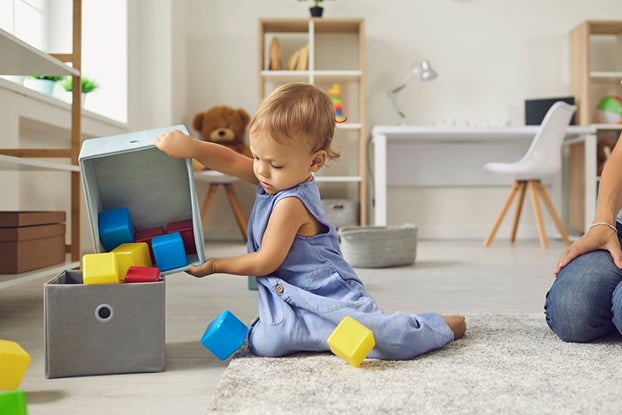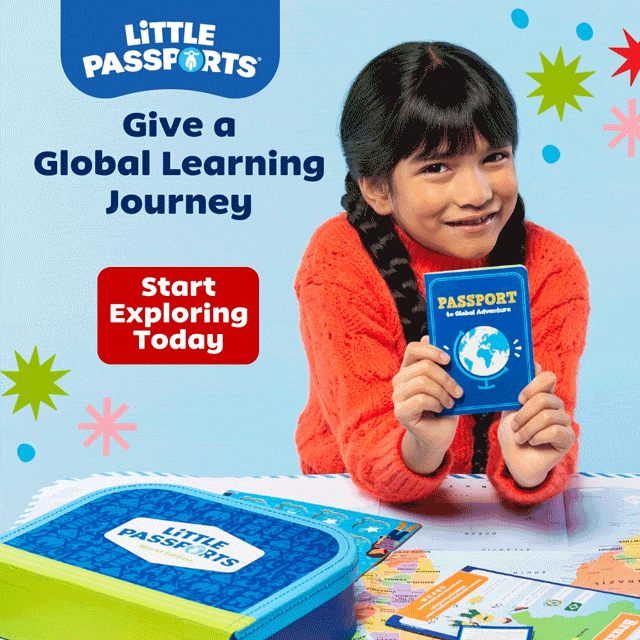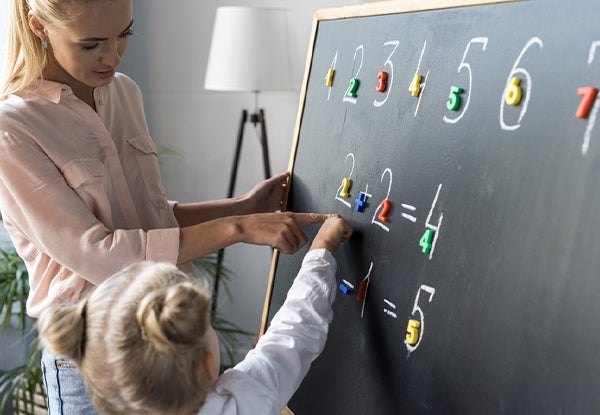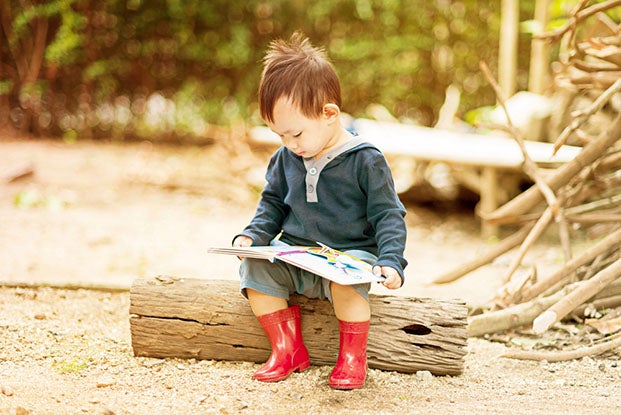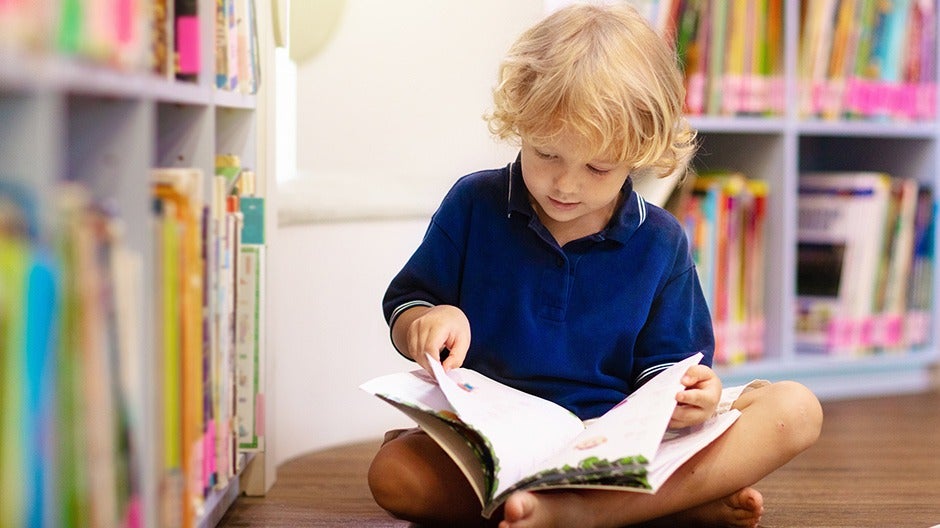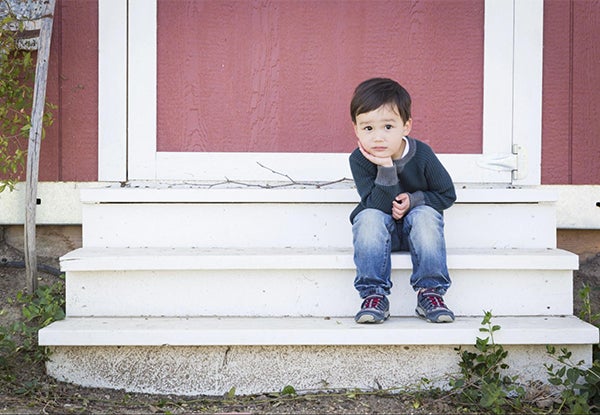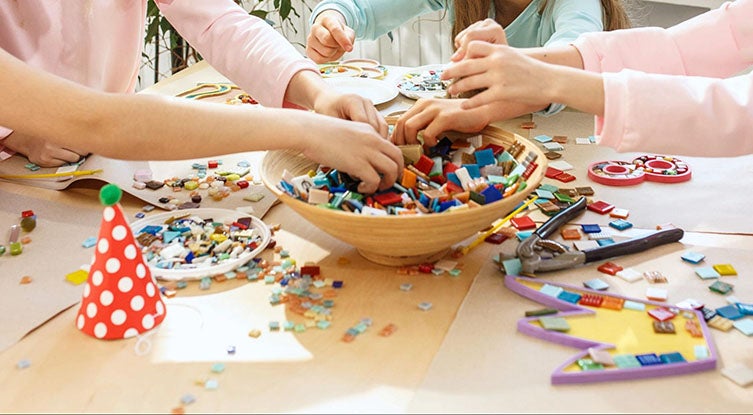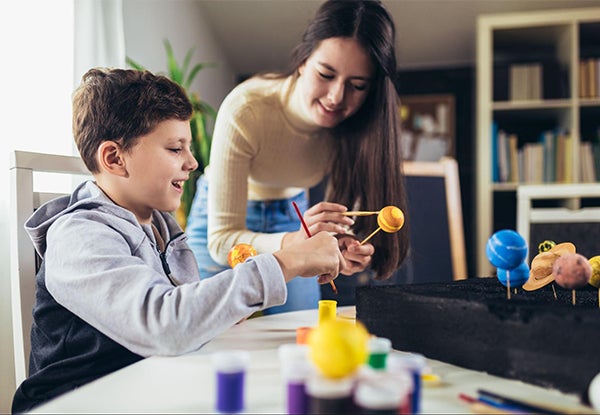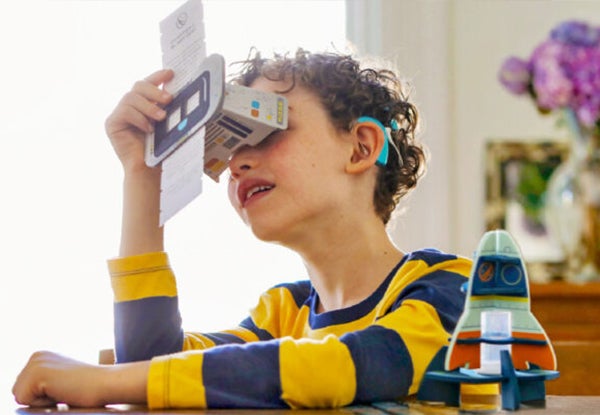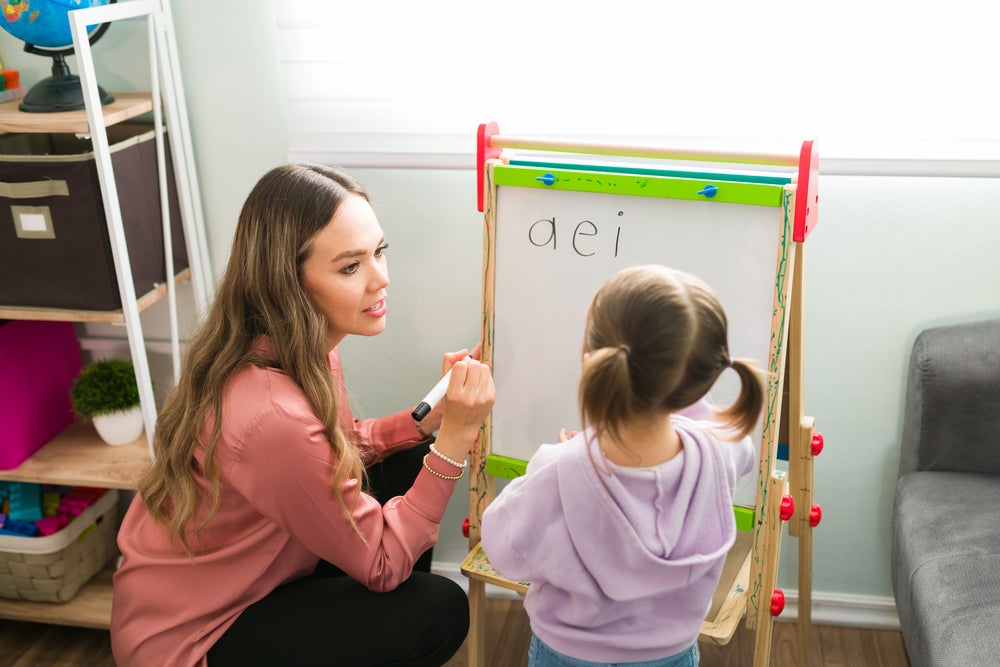For many kids, there comes a stage when they’re always tugging on your sleeve and asking you to play with them. It’s hard to resist that adorable face, but sometimes you need a little time to get things done. Around then, you might find yourself starting to wonder about independent play.
In this article, we’ll tell you what independent play is, why it’s so important for your child’s development, and how to encourage it. We’ll even give you examples of activities to try. Let’s get started!
Table of Contents
- What Is Independent Play?
- The Importance of Independent Play
- Independent Play Ideas
- How To Encourage Independent Play
What Is Independent Play?
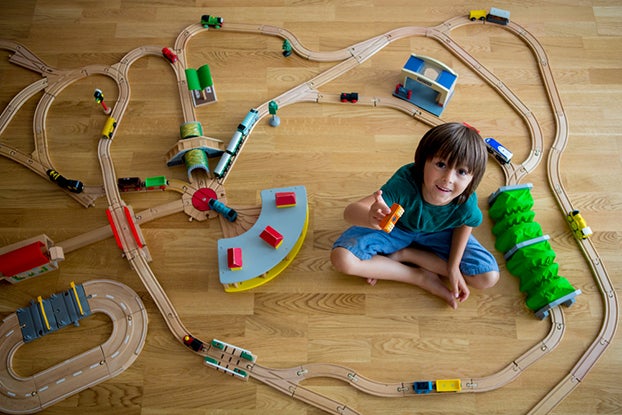
Independent play is just what it sounds like—it’s when children play by themselves, self-managing their own fun.
Before you start getting nervous or feeling guilty, let us be clear: independent play is not the same as unsupervised play. With independent play, a parent or caregiver is always at hand, ensuring that the child is safe and has any needed support.
Children can start playing independently for small blocks of time as early as one to two years old. At the beginning, it may be just for five or 10 minutes at a time. As they get older, they’ll develop the ability to play independently for longer and longer.
The Importance of Independent Play
Independent play is a key part of a child’s development, fostering all sorts of new and important skills. Here are five of our favorite benefits of independent play.
Encourages Creativity
Without input from a playmate or parent, a child playing independently has a lot of freedom in what they play with and how they go about it.
If they want to pretend they’re a pilot as they jet their stuffies around the room or imagine themselves a top chef in their own play test kitchen, the choice is theirs and theirs alone.
Creates Social Independence
Independent play is also a great confidence-builder. Kids will start to feel more content and secure when they’re on their own, comfortable with their own abilities.
Decreases Reliance on Adults
When your child plays on their own, they learn to be less dependent on others around them. They don’t need to be entertained—instead, they’re happy making their own fun.
Develops Problem-Solving Skills
There are bound to be things that come up while playing that your child will have to figure out. How does that puzzle piece fit in? Where should their action figure go on today’s adventure? Without someone to guide them, they learn to problem solve on their own.
Gives Parents More Time
Of course, a few minutes of independent play for your child means some additional time for you. You could work on a crossword puzzle, read a book, or cook a meal while still being near, knowing your child is safe and busy.
Independent Play Ideas

There are no rules for independent play—almost anything can act as the basis of a game or activity. But having engaging, age-appropriate toys and activities on hand can make it easier for kids to start playing on their own. Here are some ideas to consider.
Sensory Toys
When your child is young, they’re just developing their senses. Whether it’s a book that features pull tabs and textures, mirrors, and sounds, or a toy that does the same, sensory play can be a great way to develop sight, sound, and touch.
Building Blocks
Whether you choose traditional blocks or magnetic tiles, stacking toys, or even a bunch of empty boxes on recycling day, your little one will delight in stacking things up—and knocking them down.
Matching Activities
There are tons of games that encourage your child to try to match objects. You can even give them the sock bin on laundry day and challenge them to find the pairs. Now if that’s not a win-win, what is?
Musical Toys
Many kids love making music. Have some instruments on hand—like a maraca, harmonica, keyboard, rattle, or even drum set—and give them free reign to get creative.
If you don’t have musical toys, a large spaghetti pot and a wooden spoon can do the trick!
Pretend Play
As they get older, offer your child activities that stimulate their storytelling skills.
Dolls, action figures, and stuffed animals can be characters, while doll houses, play kitchens, homemade backdrops you draw or craft from construction paper, or activity mats can be a perfect setting. Your child will bring the plot and dialogue.
You can sit back and listen as they practice pretend play. Your child’s boundless imagination is sure to surprise you.
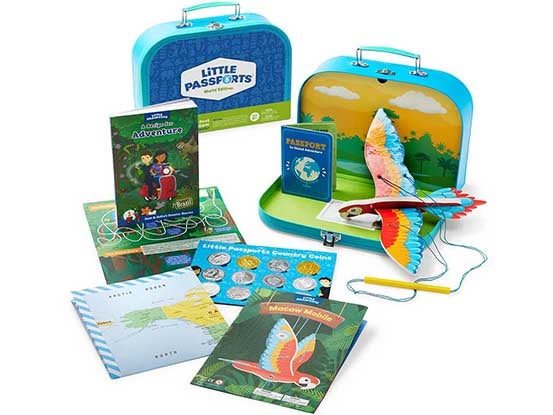
To inspire your child’s playtime, our Animals Wild play kit subscription offers a romp through the animal world designed for kids ages 3–5, kicking off with a pop-up playset with lift-the-flap surprises set in the Amazon rainforest.
There are 3D animals, puzzles, and games, and even fun facts about this biodiverse wonder of the world. Watch as your little one imagines how the brightly colored macaw, stealthy jaguar, and exciting poison dart frog pass their day under the rainforest’s canopy.
Puzzles
Whether they’re just a couple of pieces or 100, noodling over a puzzle helps build your child’s problem-solving skills, patience, and spatial awareness.
Age-Appropriate Books
You can also encourage independent play by having a few of your young learner’s favorite books to read on hand. Even if they’re not reading yet, they can turn the pages, follow the pictures, and re-create the story or imagine their own adventures.
Art Projects
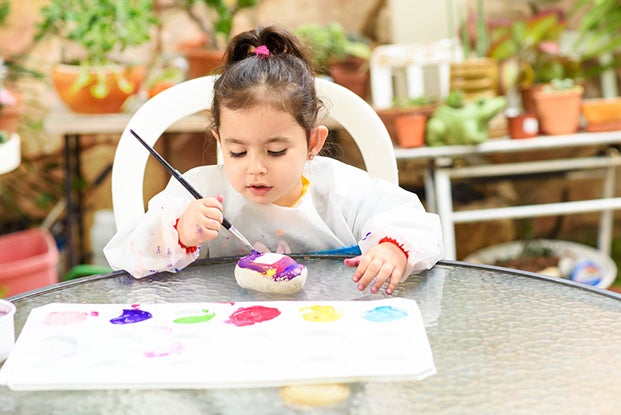
Markers, crayons, and a sketch pad are all kids need for an afternoon of creativity. If they’re more of a sculptor, a few jars of play dough or clay can do the trick as well. Don’t forget the smock!
Learning Games
If your child loves to challenge themselves with letters and numbers, they might want to use their independent time honing their core skills.
Our HOMER Early Learning Kits focus on the skills kids need most to thrive in school. Through fun games and activities designed by our learning experts, they work on the ABCs, math skills, exploring feelings, and more. The six-month subscription supports your child’s reading and writing skills and builds their love of learning.
How To Encourage Independent Play
At first your child might be resistant to independent play, but with a little practice, for many kids it will become a fun part of their day. Here are some ways to encourage them to take this developmental step.
Organize Your Child’s Toys
It’s helpful to be intentional about independent play, so going through the toy bin and sorting the toys into groups—for example, activity toys, musical toys, sensory toys, art supplies—will make it easier for them to find what they want come independent play time.
Choose a Fresh Location
As with any routine, it helps to make it a bit distinct. If you choose a location where this play happens on a daily basis, your child may get used to it faster and transition more easily into playing on their own.
Give Your Child Lots of Choices
If your child has trouble selecting something to do even after you’ve organized their toys, try setting out a number of choices so they can decide what to do with this “me time.”
Get Them Started

You can’t just plunk your child down on the play mat for the first time and expect them to know what to do. It can be helpful to model what independent play looks like before leaving to play on their own.
Use a Timer
When your child knows that independent play time has a beginning and end, it may be easier to get them started. Don’t worry, if the buzzer rings and they’re still having a ball, they can keep going as long as they like.
Don’t Interrupt
No matter how adorable they’re being, resist the inclination to comment on or jump into their playtime (“I love your singing! Can I join in?”), as that defeats the purpose.
Once their independent play is done, you can ask them questions about their game, compliment them on their creativity or do something fun together.
Make It Part of the Daily Routine
As with anything, doing it daily will help your child get used to playing on their own. Every day, you can add another minute or two to the allotted time to ease their way into longer periods.
Gaining Independence with Begin
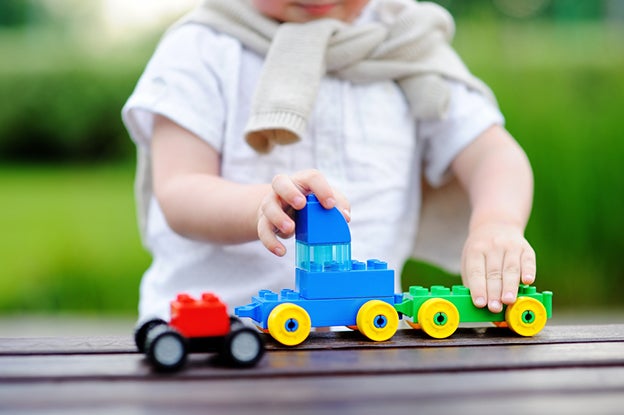
Independent play has a host of benefits that will set your child up for future success. From problem solving to creativity, prolonged focus, and self-confidence, that block of “me time” is key for their development.
At Begin, our hands-on activity kits provide the perfect springboard for an exciting afternoon of independent play.
For children ages three to five, Little Passports: Early Explorers will take them on an adventure around the world, while our Science Junior kits will ignite the curiosity of kids five to eight years old. The Begin premium subscription also contains hands-on activities matched to your child’s age and stage.
With activity kits coming monthly, you can be assured that your child’s independent play will always be fun and fresh!
